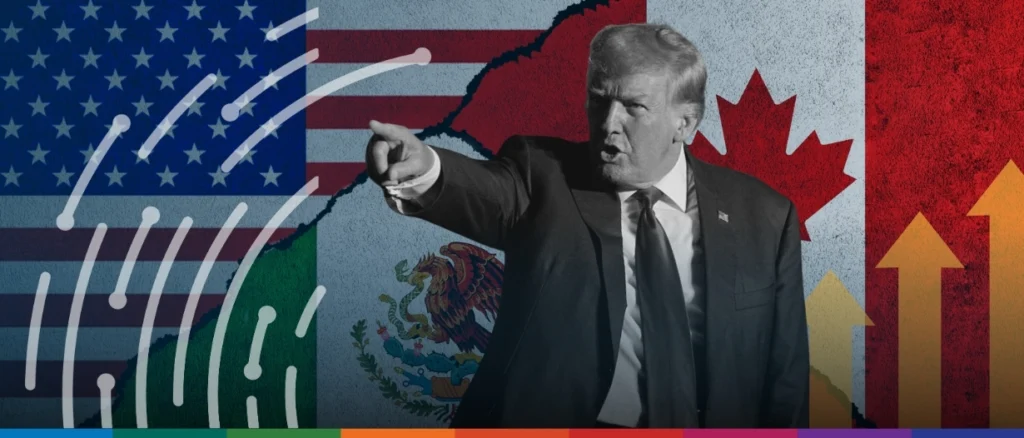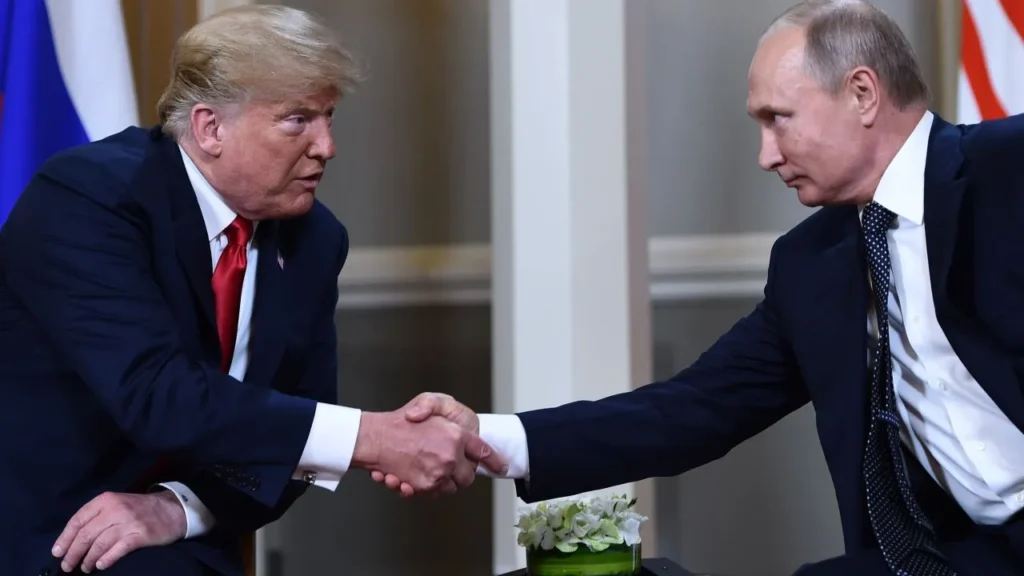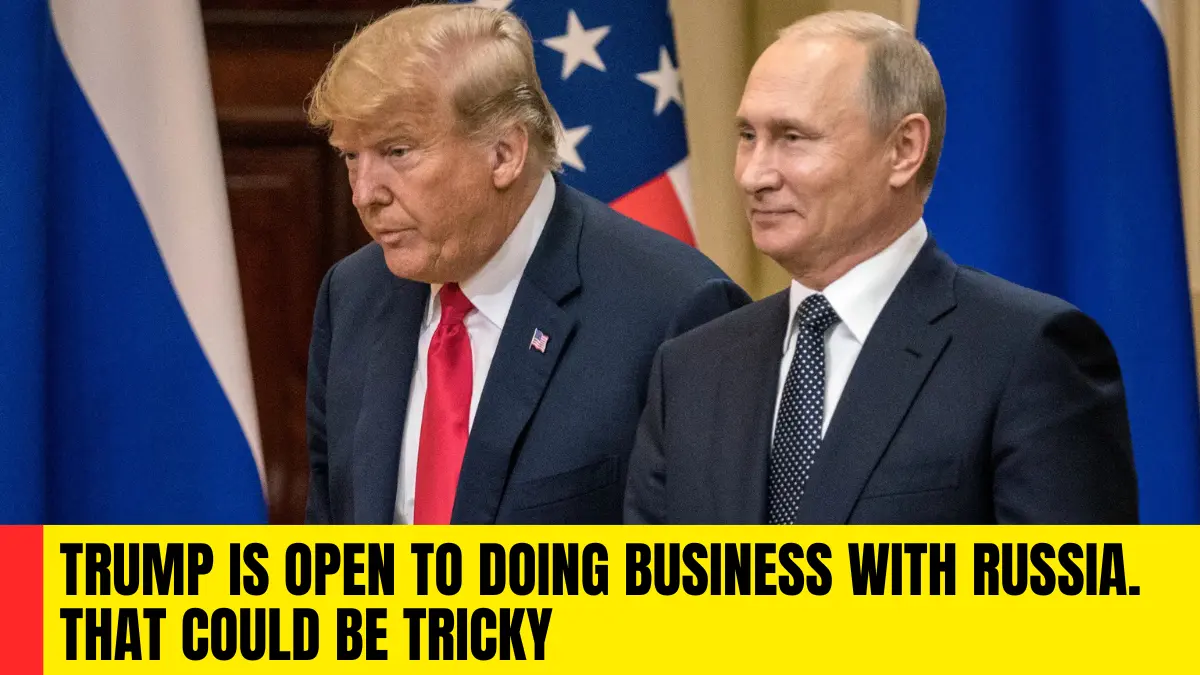Trump says he’s open to U.S. companies doing business with Russia if a Ukraine peace deal is reached. But sanctions, corruption, and global energy shifts make it a tricky prospect.
Table of Contents
Introduction
US President Donald Trump and Russian President Vladimir Putin are preparing for high-stakes talks in Alaska that could reshape global politics and business. While the meeting’s primary goal is advancing peace in Ukraine, Trump has hinted at something that could have enormous economic implications: reopening the door for American companies to do business in Russia.
“I noticed Putin’s bringing a lot of business people from Russia, and that’s good,” Trump told reporters aboard Air Force One on Friday. “They want to do business, but they’re not doing business until we get the war solved.”
For U.S. corporations, which fled Russia en masse after the 2022 invasion of Ukraine, the idea of re-entering the Russian market raises both opportunities and extraordinary risks.
Western Companies Have Left Russia in Droves
Following Moscow’s full-scale invasion of Ukraine in February 2022, more than 1,000 global firms either exited or scaled back operations in Russia, according to research from the Yale School of Management.
- Apple, Goldman Sachs, and Mastercard were among those who withdrew.
- Starbucks sold its Russian operations, replaced by the copycat Stars Coffee brand.
- McDonald’s sold off its restaurants, which reopened as Vkusno i tochka (“Tasty, period”).
Today, Russia’s consumer market is filled with Chinese companies and domestic imitations of American brands. The sheer scale of the corporate exodus means there are far fewer Western firms left to rebuild commercial ties than before.
For U.S. businesses that left, returning could mean reputational risks, logistical hurdles, and navigating an unstable regulatory environment.
Russia’s Energy Shift: New Customers, Old Problems
Energy remains Moscow’s economic lifeline. Oil and gas revenues accounted for 30% of Russia’s federal budget in 2024, according to the Oxford Institute for Energy Studies.
Western sanctions cut deeply:
- The EU banned seaborne Russian oil imports and reduced pipeline gas dependence from over 40% (2021) to about 11% (2024).
- The G7 price cap prevented companies from providing shipping and insurance services if oil was sold above $60 a barrel.
But Russia adapted by turning to new buyers:
- India now imports 36% of its oil from Russia, making Moscow its top supplier.
- China has become a dominant energy partner, securing long-term discounted oil and gas flows.
For U.S. firms, re-entry into Russia’s energy market would require dismantling or bypassing sanctions — a process that would demand cooperation not just from Washington but also from Brussels, London, and other allies.
Trump’s Tariff Threats

Trump has threatened to impose tariffs on countries that continue to buy Russian crude, specifically targeting India and China.
His calculation: squeeze Moscow’s oil revenues hard enough to force Putin to the negotiating table.
But global energy analysts warn that:
- Tariffs may be difficult to enforce without multilateral support.
- Emerging economies could simply deepen ties with Russia, ignoring U.S. pressure.
- Unwinding sanctions like the G7 oil price cap would be legally and diplomatically complex.
The Banking Problem
Even if Trump were to push for economic engagement, a fundamental obstacle remains: Russia’s banking isolation.
- In 2022, the U.S., EU, UK, and Canada banned key Russian banks from SWIFT, the international messaging system for cross-border payments.
- As a result, transferring money in and out of Russia became nearly impossible for Western corporations.
Janis Kluge, a researcher at the German Institute for International and Security Affairs, explained: “The U.S. cannot simply re-admit Russian banks to SWIFT without EU cooperation, since the system is based in Belgium.”
Without financial access, Western firms would struggle to conduct even basic transactions.
Corruption and Governance Risks
Russia already had one of the world’s highest corruption levels before the war. According to Transparency International’s Corruption Perceptions Index:
- In 2021, Russia ranked 136th of 180 countries.
- By 2024, it slid further to 154th, on par with Azerbaijan, Honduras, and Lebanon.
For multinational firms, corruption increases costs, complicates compliance, and heightens reputational risks.
Even if sanctions were lifted, these governance issues would make Russia a challenging market.
Would Russian Consumers Welcome Back U.S. Brands?

The exit of Western firms left gaps in Russia’s consumer economy, partially filled by Chinese imports and local substitutes.
- Stars Coffee mimics Starbucks, with a logo featuring a woman inside a circle and a star overhead.
- Vkusno i tochka replicates McDonald’s menu, complete with rebranded Big Macs.
- Local smartphone makers and Chinese giants like Xiaomi have replaced Apple in retail stores.
If U.S. companies returned, Russian consumers would likely embrace them enthusiastically. But brand loyalty may have eroded after three years of absence, making it harder to regain market share.
Why Doing Business in Russia Remains Tricky
Even if Trump secures a peace deal in Alaska, restarting business ties with Russia will be far from straightforward:
- Sanctions Infrastructure: Dozens of sanctions target Russian banks, industries, and individuals. Undoing them requires multilateral coordination.
- Financial Barriers: Without SWIFT access, trade settlement remains cumbersome.
- Corruption: A deteriorating governance environment adds risk for foreign investors.
- Geopolitical Costs: U.S. firms that re-enter Russia may face backlash from European allies and domestic critics.
- Competition: Chinese and Indian firms have already seized much of the market left behind by Western departures.
FAQs
1. What did Trump say about doing business with Russia?
Trump said he’s open to discussing U.S.-Russia business ties if peace progress is made in Ukraine, noting that Russian officials brought business leaders to Alaska talks.
2. Why did U.S. companies leave Russia in 2022?
Most firms exited after Putin’s invasion of Ukraine, citing sanctions, reputational risk, and operational difficulties.
3. Who replaced U.S. companies in Russia?
Chinese automakers, tech companies, and local copycat brands like Stars Coffee and Vkusno i tochka have filled the void.
4. What’s the main barrier to restarting business?
Sanctions, corruption, and the exclusion of Russian banks from SWIFT make operations legally and financially difficult.
5. Could American energy companies return to Russia?
Not easily. The G7 oil price cap, EU sanctions, and Russia’s pivot to Asia complicate U.S. energy re-entry without broad international cooperation.
